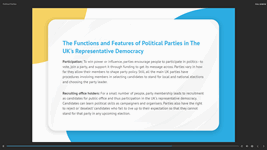
Politics for British Diploma Course
Level 5 Endorsed Diploma | CPD UK Certified | 150 CPD Points | Exam & Full Tutor Support Included | 24x7 Access
One Education
Summary
- Exam(s) / assessment(s) is included in price
- Tutor is available to students
Add to basket or enquire
Overview
Do you feel left out of political conversations and want to participate more actively? Politics for British is the comprehensive course that can help you gain a deeper understanding of politics. With 25 modules covering a wide range of topics, you'll have a solid foundation in the basics of politics and the intricacies of different political ideologies.
Imagine being able to confidently participate in political conversations with your colleagues, friends, and family. You’ll be able to understand the different political parties, the role of pressure groups, and the nature and sources of the British constitution. You’ll also learn about different political ideologies like liberalism, socialism, and nationalism. Plus, you’ll gain insights into the US political system and the constitutional framework of the US government.
Learning Outcomes:
- Understand the basics of politics, democracy, and participation
- Recognise the role of elections, referendums, and political parties in the UK and US
- Gain insights into different political ideologies and pressure groups
- Develop a deeper understanding of the UK constitution and the role of parliament, prime minister, and cabinet
- Understand the role of the judiciary and devolution in the UK political system
- Gain a comparative approach to political systems in the UK and the US
This course is endorsed by the Quality Licence Scheme, ensuring your newly acquired skills will enhance your professional development.
Meet the Accreditation
The CPD Certification Service (CPD UK) assures the Politics course training and learning activities are relevant, reliable, and upto date.
Why People Enrol this Course From One Education:
- Access the course through our dedicated online learning platform
- 24/7 access to tutor support
- This course is packed with interactive course content
- Affordable prices and high-quality training
- Complete the course 100% online, from any internet-enabled device
- Flexible course deadlines with full access to the course for one year
Achievement
CPD
Course media
Description
This masterclass is designed by industry experts and will give you an in-depth understanding of this topic. The course features easy-to-digest modules that break down each topic and ensure all our students receive an unrivalled and thorough learning experience.
If you want to work in this rapidly growing sector and stand out from the competition, then our Politics course is the perfect place to kickstart your dream career.
On this course, we guarantee that you will gain relevant skills and acquire tremendous knowledge on the subject. The certificate you’ll achieve after completing the course will help you land the job you want in a related field.
Course Curriculum:
Politics
Module 01: Introduction to Politics
- What is Politics
- Defining Politics: A Few Opinions
- Deductive and Inductive Theories of Politics
- Can Politics Be a Science?
- The Political Importance of the State
- A Typology of the State
- State and sovereignty
Module 02: Democracy and Participation
- Introduction to Democracy
- Forms of Democracy
- Advantages and Disadvantages of Direct Democracy and Representative Democracy
- The Case for Reform of The UK Democratic System
- Voter Turnout
- Party Membership
- Is There a Crisis of Participation?
- What Should Be Done to Reform the System?
- Suffrage
Module 03: Elections and Referendums
- Different Electoral Systems
- First Past The Post (FPTP)
- Advantages of FPTP
- Disadvantages of FPTP
- Additional Member System (AMS)
- Advantages of the Additional Member System (AMS)
- Disadvantages of the Additional Member System (AMS)
- Single Transferable Vote (STV)
Module 04: Political Parties
- Political Parties
- The Functions and Features of Political Parties in The UK’s Representative Democracy
- The Funding of UK Political Parties
- Established Political Parties
- The Development of a Multi-Party System
- Various Factors That Affect Party Success
Module 05: Pressure Groups
- Pressure Groups
- Functions of Pressure Groups
- Classifying Pressure Groups
- Methods Used by Pressure Groups
- Factors in The Success and Failure of Pressure Groups
- Pressure Groups, Society and Democracy
- Think Tanks, Lobbyists and Celebrities
Module 06: The European Union
- The Development of The European Union
- Map of the European Union
- The Aims of The European Union
- The European Union’s values
- A Single European Market
- Economic, Social and Territorial Cohesion
- An Economic and Monetary Union
Module 07: The Nature and Sources of The British Constitution
- What Is A Constitution?
- The Development of The Constitution
- The Nature and Theory of The Constitution
- The Five Main Sources of The UK Constitution
Module 08: Parliament
- The History and Status of Parliament
- Parliamentary Sovereignty
- The Structure of The UK Parliament and Its Office Holders
- The Structure of The House of Commons
- The Structure of The House of Lords
- Legislation
- The Legislative Process
- How Effective Is The UK Parliament Today?
Module 09: The Prime Minister and Cabinet
- The Executive
- The Prime Minister
- What Is The Role Of The Prime Minister?
- Who Becomes Prime Minister?
- How Powerful Is The Prime Minister?
- The Cabinet
- Cabinet Ministers
- Cabinet Meetings
- Cabinet Committees
- The Cabinet Office
Module 10: The Judiciary
- The Nature of The Senior Judiciary
- The Supreme Court
- Why Was The UK Supreme Court Established?
- What Functions Does The Supreme Court Perform?
- The Appointments Process Of The Supreme Court
- Key Doctrines and Principles That Underpin The Work Of The Supreme Court
- The Power of The UK Supreme Court
Module 11: Devolution
- Devolution
- Origins of Devolution
- The Scottish Parliament and Government
- The Welsh Assembly and Government
- The Northern Ireland Assembly and Executive
- The Impact of Devolution on UK Politics
Module 12: Liberalism
- Core Idea
- Individualism
- Freedom or Liberty
- The State: A ‘Necessary Evil’
- Rationalism
- Equality and Social Justice
- Liberal Democracy
Module 13: Conservatism
- Historical Overview
- Core Ideas and Principles
- Authoritarian Conservatism
- Paternalistic Conservatism
- Libertarian Conservatism
- National Conservatism
Module 14: Socialism
- Historical Overview
- Core Ideas and Principles
- Types of Socialism
- Revival of Socialism?
Module 15: Nationalism
- Historical Overview
- Core Ideas and Principles
- Types of Nationalism
Module 16: Feminism
- Historical Overview
- Core Ideas and Principles
- Types of Feminism
Module 17: Multiculturalism
- Historical Overview
- Core Ideas and Principles
- Types of Multiculturalism
Module 18: Anarchism
- Anarchism
- Historical Overview
- Core Ideas and Principles
- Types of Anarchism
Module 19: Ecologism
- Ecologism
- Historical Overview
- Core Ideas and Principles
- Types of Ecologism
Module 20: The Constitutional Framework of US Government
- The Nature of The US Constitution
- The Principles of The US Constitution and Their Effectiveness Today
Module 21: The Legislative Branch of Government: Congress
- The Structure of Congress
- The Functions of Congress
- The Changing Powers of Congress
Module 22: The Executive Branch of Government: President
- Formal Sources of Presidential Power as Outlined in The US Constitution and Their Use
- Informal Sources of Presidential Power and Their Use
- The Executive Office of the President (EXOP)
- Relationships Between The Presidency and Congress
- Relationships Between The Presidency And The Supreme Court
- Limitations on Presidential Power and Why This Varies
Module 23: The Judicial Branch of Government
- The Nature and Role of The Supreme Court
- The Appointment Process for The Supreme Court
- Factors Influencing The President’s Choice Of Nominee
- The Role of Judicial Activism and Judicial Restraint
- The Protection of Civil Liberties and Rights in The US Today
- The Effectiveness of The Supreme Court in Protecting Rights
Module 24: The Electoral Process and Direct Democracy
- Electoral Systems in The USA
- Campaign Finance
- Key Ideas and Principles of The Democratic and Republican Parties
- Conflicts and Tendencies
- Interest Groups in The USA
Module 25: Comparative Approaches
- Theoretical Approaches
- Similarities and Differences in The Constitution
- Legislatures: Congress and Parliament
- President and Prime Minister: Five Key Constitutional Differences
- Judiciary and Civil Rights
How is this Course assessed?
To assess your learning, you have to complete the assignment questions provided at the end of the course. You have to score at least 60% to pass the exam.
Certificate of Achievement
Endorsed Certificate of Achievement from the Quality Licence Scheme
After successfully completing this course, learners will be able to order an endorsed certificate as proof of their achievement. The hardcopy of this certificate of achievement endorsed by the Quality Licence Scheme can be ordered and received straight to your home by post, by paying —
- Within the UK: £109
- International: £109 + £10 (postal charge) = £119
CPD Accredited Certification from One Education
After successfully completing this Politics course, you will qualify for the CPD Certification Service (CPD UK) certified certificate from One Education.
Certification is available in both PDF & hardcopy format, which can be received by paying —
- PDF Certificate: £9
- Hardcopy Certificate (within the UK): £15
- Hardcopy Certificate (international): £15 + £10 (postal charge) = £25
Who is this course for?
This Politics course is ideal for
- British citizens who want to gain a deeper understanding of UK politics
- Individuals who want to participate actively in politics
- Students of politics or related fields
- Anyone interested in politics or pursuing a career in public service
Requirements
There are no specific prerequisites to enrol in this course. Anyone and everyone can take this course.
The course is fully accessible from any internet-enabled smart device. So, you can study from the comfort of your home!
All you need is a passion for learning, literacy, and being over the age of 16.
Career path
- Political Analyst (£30,000 - £60,000)
- Public Relations Officer (£22,000 - £45,000)
- Political Researcher (£24,000 - £42,000)
- Political Campaign Manager (£25,000 - £50,000)
- Lobbyist (£22,000 - £70,000)
- Civil Servant (£20,000 - £80,000)
- Diplomat (£27,000 - £80,000)
Questions and answers
Currently there are no Q&As for this course. Be the first to ask a question.
Reviews
Legal information
This course is advertised on reed.co.uk by the Course Provider, whose terms and conditions apply. Purchases are made directly from the Course Provider, and as such, content and materials are supplied by the Course Provider directly. Reed is acting as agent and not reseller in relation to this course. Reed's only responsibility is to facilitate your payment for the course. It is your responsibility to review and agree to the Course Provider's terms and conditions and satisfy yourself as to the suitability of the course you intend to purchase. Reed will not have any responsibility for the content of the course and/or associated materials.








